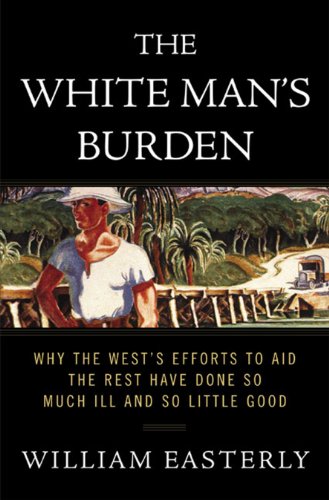
The White Man's Burden
Why the West's Efforts to Aid the Rest Have Done So Much Ill and So Little Good
کتاب های مرتبط
- اطلاعات
- نقد و بررسی
- دیدگاه کاربران
نقد و بررسی

January 16, 2006
No one who attacks the humanitarian aid establishment is going to win any popularity contests, but, neither, it seems, is that establishment winning any contests with the people it is supposed to be helping. Easterly, an NYU economics professor and a former research economist at the World Bank, brazenly contends that the West has failed, and continues to fail, to enact its ill-formed, utopian aid plans because, like the colonialists of old, it assumes it knows what is best for everyone. Existing aid strategies, Easterly argues, provide neither accountability nor feedback. Without accountability for failures, he says, broken economic systems are never fixed. And without feedback from the poor who need the aid, no one in charge really understands exactly what trouble spots need fixing. True victories against poverty, he demonstrates, are most often achieved through indigenous, ground-level planning. Except in its early chapters, where Easterly builds his strategic platform atop a tower of statistical analyses, the book's wry, cynical prose is highly accessible. Readers will come away with a clear sense of how orthodox methods of poverty reduction do not help, and can sometimes worsen, poor economies.

Starred review from February 1, 2006
As the dictator of Haiti for decades, Papa Doc Duvalier had good reasons--tens of millions of them--to praise international aid agencies for their generosity. As a former analyst in the World Bank system that coordinates such generosity, Easterly thinks it is time to start listening to people other than corrupt dictators and self-congratulatory bureaucrats in assessing international-aid projects. Though he acknowledges that such projects have succeeded in some tasks--reducing infant mortality, for example--Easterly adduces sobering evidence that Western nations have accomplished depressingly little with the trillions they have spent on foreign aid. That evidence suggests that in some countries--including Haiti, Zaire, and Angola--foreign aid has actually intensified the suffering of the poor. By examining the tortured history of several aid initiatives, he shows how blind and arrogant Western aid officers have imposed on helpless clients a postmodern neocolonialism of political manipulation and economic dependency, stifling democracy and local enterprise in the process. Easterly forcefully argues that an ambitious new round of Western aid programs will help the suffering poor only if those who manage them wake up from the ideological fantasy of global omniscience and begin the difficult search for piecemeal local approaches, rigorously monitoring the results of every project. Proffering no blueprint for bringing poverty and disease to an end, Easterly does set the terms for a debate over how to give foreign aid a new start.(Reprinted with permission of Booklist, copyright 2006, American Library Association.)

























دیدگاه کاربران